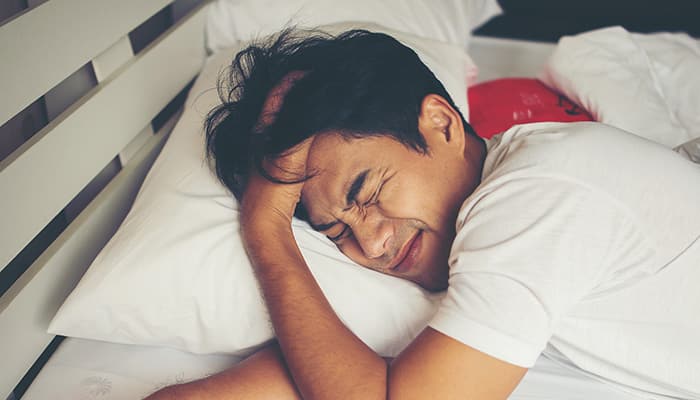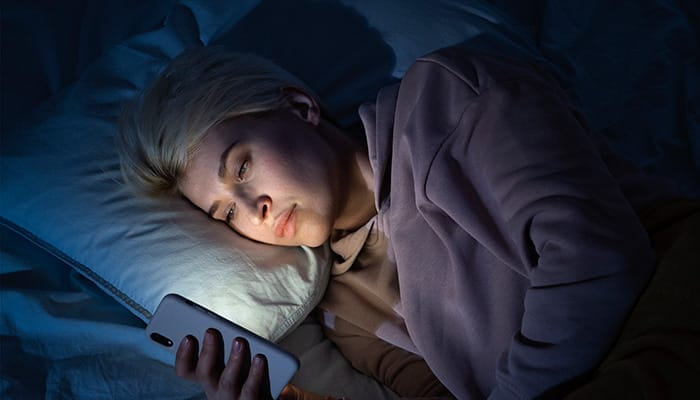Insomnia is a sleep disorder characterized by difficulty falling asleep, staying asleep, or experiencing poor-quality sleep. It can lead to various negative consequences, such as daytime fatigue, difficulty concentrating, mood disturbances, and reduced overall well-being.
There are two primary types of insomnia:
1. Primary Insomnia
This type of insomnia is not directly associated with any other health condition or external factors. It’s often related to psychological or behavioral factors, including stress, anxiety, depression, or poor sleep habits.
2. Secondary Insomnia
Secondary insomnia is caused by underlying medical, psychological, or lifestyle factors. It can be a result of conditions like chronic pain, medical disorders, medications, substance abuse, or certain mental health issues.
This is the heading
Common symptoms of insomnia include:
- Difficulty falling asleep at night
- Waking up frequently during the night
- Waking up too early in the morning
- Feeling unrefreshed upon waking
- Daytime sleepiness or fatigue
- Irritability, mood changes, or difficulty concentrating during the day
- Treatment for insomnia depends on its underlying cause.

Is Insomnia Curable?
Insomnia is often considered a manageable condition rather than a disease with a definite “cure” in the traditional sense. However, many individuals with insomnia can significantly improve their sleep quality and manage their symptoms with the right treatments and lifestyle adjustments. The goal of treatment is to minimize the impact of insomnia on daily life and improve overall well-being.
Here are a few important points to consider:
- Remission and Management: Insomnia can go into remission, meaning that individuals can experience periods of improved sleep quality and reduced symptoms. However, due to various factors like stress, changes in routine, or other life events, insomnia symptoms might reoccur.
- Treatment Success: Many people experience substantial improvement in their sleep quality through treatments like Cognitive Behavioral Therapy for Insomnia (CBT-I) and lifestyle adjustments. These improvements can often be maintained over the long term.
- Lifestyle Factors: Adopting good sleep hygiene practices and maintaining a healthy lifestyle can contribute to managing and preventing insomnia symptoms. This includes practices like maintaining a consistent sleep schedule, creating a comfortable sleep environment, avoiding stimulants close to bedtime, and managing stress.
- Underlying Causes: Addressing any underlying medical, psychological, or lifestyle factors that contribute to insomnia can significantly improve sleep quality. For example, treating medical conditions, managing stress and anxiety, and discontinuing substances that disrupt sleep can lead to better sleep.
- Individual Variability: People’s responses to treatments can vary. What works well for one individual might not work as effectively for another. It’s important to work closely with a healthcare professional to tailor a treatment plan to your specific needs.


What is the Best Treatment for Insomnia?
Cognitive Behavioral Therapy for Insomnia (CBT-I) is considered one of the most effective treatments for chronic insomnia and is often recommended as a first-line approach. It has been shown to be more sustainable and have longer-lasting effects compared to medication alone. However, whether it’s the “best” treatment depends on the individual’s specific situation, preferences, and underlying causes of their insomnia.
Here are some reasons why CBT-I is often regarded as a highly effective treatment for insomnia:
- Addresses Root Causes: CBT-I targets the psychological and behavioral factors that contribute to insomnia, such as anxiety, stress, and poor sleep habits. By addressing these underlying causes, it can provide lasting improvements in sleep quality.
- Non-Pharmacological Approach: Unlike medication, CBT-I is a non-drug treatment that doesn’t involve the risk of dependency or potential side effects associated with sleep medications.
- Long-Term Benefits: CBT-I equips individuals with skills and techniques they can use to manage their sleep even after the formal treatment is completed. This promotes long-term improvements in sleep habits and patterns.
- Personalized Treatment: CBT-I is tailored to each individual’s specific sleep patterns, habits, and challenges. This personalized approach increases the likelihood of success.
- Minimal Side Effects: CBT-I does not come with the side effects often associated with sleep medications, making it a safer option for many individuals.
- Improves Daytime Functioning: CBT-I not only improves sleep but also enhances daytime functioning, cognitive performance, and emotional well-being.
However, it’s important to note that CBT-I might not be suitable for everyone or may not be sufficient on its own in some cases. In situations where insomnia is caused by an underlying medical or psychological condition, addressing that underlying issue is crucial. Sometimes, a combination of CBT-I and medical treatments might be the most effective approach.
Ultimately, the best treatment for insomnia varies from person to person. It’s important to work with a healthcare professional who can evaluate your specific situation, consider your preferences, and recommend the most appropriate treatment plan based on the available options.
If you’re struggling with insomnia, it’s recommended to consult a healthcare professional. They can help identify the underlying causes of your insomnia and develop a tailored treatment plan to improve your sleep quality and overall well-being.
Please call the Therapy Treatment Team 239-537-9646 to find out more on how you can start CBT-I for Insomnia.

Dr. Yaro Garcia
Hello, I am Dr. Garcia, please call me Yaro. My degrees are in clinical psychology and I am a licensed mental health counselor. My approach is caring, warm, safe, non-judgmental, and straight forward. It is a difficult decision to seek therapy, I take time to build a trusting therapeutic relationship with you…
















